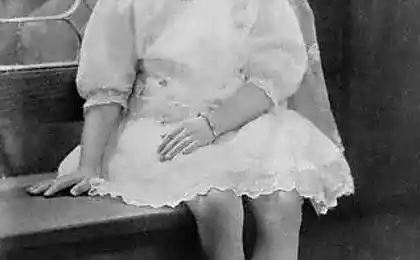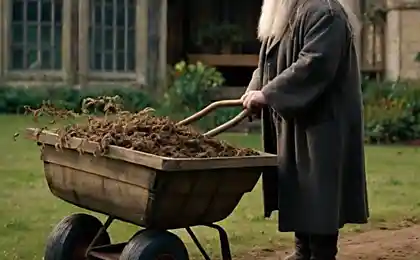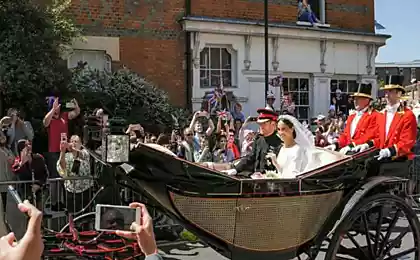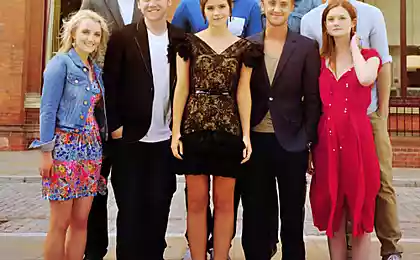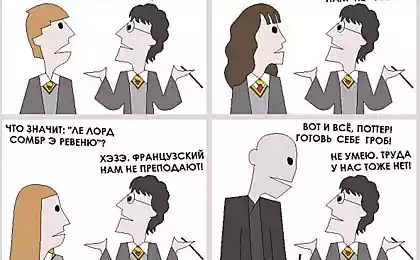999
Experiment Harry Harlow: As there is love
Eighty million three hundred thirty six thousand ninety six
American psychologist Harry Harlow (Harry Harlow) earned their experiences sinister reputation even among colleagues. The paradox is that he thereby got for the science data that proved the need for more cordial relations of people to each other. It happened in 50 years. Initially, Harlow worked on the development of intelligence test for monkeys. He showed that they are able to solve problems much more complex than considered by the authors of the earlier studies.
Studying rhesus monkeys, Harlow isolated young mothers and their peers. This circumstance played a decisive role in the fact that he had hit upon a discovery which brought him fame.

He noticed that monkeys, when they were separated from their mother, was done extremely attached to the Terry towels that littered the floor of the cage. They clutched in their jaws, embraced them and became hysterical when the towel was taken away. What happened? Affection at the time, was understood solely in terms of food reinforcement. Baby loves mother because she satisfies his hunger. Harlow fed calves out of the hands of small bottles.
When he removed the bottle, monkey just turned away. But when he tried to take away their towel, came something completely different: monkeys began to scream hysterically, threw themselves on the floor and grab onto the towel with a death grip. Harlow looked at the screaming monkeys and thought about how there is love. Came to him a sudden thought. As his biographer writes Blum, the best way to understand the heart – break it down. Soon, Harlow began his famous experiments.

Using the metal shears and a soldering iron he built of wire mesh "surrogate mother." To it was attached the nipple from which flowed the monkey milk.

In addition, he made a soft surrogate mother, wrapping her body with Terry cloth. The second mother had no nipple. Newborn babies were put in cages with two surrogate mothers. Adult monkeys that were deprived of children, screamed and beat against the walls of the cells; the kids groaned, once in a separate room. This continued hour after hour, the lab was filled with cries of despair and foul: loose stools, wrote Harlow, indicates a high degree of emotional stress.
But then started to happen amazing things. A few days later, the cubs transferred their attachment with real mothers who were now unavailable, cloth surrogate; they clung, crawled on them, fondled them "face" their little paws and spent many hours sitting on their back and stomachs. Cloth mother could not feed milk and when the cubs were hungry, they went to the wire mother, but then back again to the fabric.

After some time, Harlow placed monkeys in a small unfamiliar room with one of the surrogate mothers. If they were a nursing mother, the cubs were shaking with fear, cried and shrank into a ball on the floor.

If the room was a cloth surrogate mother, their behavior was different: monkeys feel safe with interest studied the room and the objects located in it.

Harlow made a report, which he called "Nature love" and which became a classic: "We are not surprised to find that the comfort that brings the contact, is the basis of variables such as affection and love, but we didn't expect it to completely overshadow such factors as food; indeed, the difference was so large that it was forced to assume: the main function of the feeding – providing frequent and close body contact of the baby with the mother... the Love of a real and a surrogate mother look very similar. According to our observations, the attachment of baby monkeys to real mother is very strong, but she is not inferior to the love that in the experiment, the cub takes to the surrogate mother of cloth".

In 1930-1950 years was dominated by the theory of education, according to which we should not indulge a child's tactile promote, hugging him and taking his hands. Harlow showed that a mother's touch child is vital. He presented data that clearly showed: a cloth surrogate mother was more important for babies than breastfeeding. His success was triumphant and made a revolution. In 1958, Harlow was elected President of the American psychological Association. About him made a documentary film. His work has influenced the industry producing baby products: particular widespread backpacks, where parents could carry children. Orphanages and maternity hospitals have changed their policies: little baby bottles with milk, it is necessary to take on hands, to swing, to look at him and smile.

Something went wrong. A cloth surrogate mother provided the tactile contact is not worse than the present, but over the next year Harlow noticed that the monkeys raised was not quite normal. When he released them from cages so they could play with each other and form a pair, they vehemently avoided contact. Females attacked males. Some showed something similar to autism: they swayed, biting himself to the blood and bite off their own fingers.

Harlow was disappointed. Just a year ago, he solemnly announced that he had allocated the main component of education, and it has now become clear that he made a mistake. He started to drink. In subsequent articles, Harlow bravely admitted that grown surrogate mothers, the babies suffer emotional disabilities, and indicated that in addition to touching you must have at least half an hour a day game cubs with each other. To prove this position he took observations of dozens of monkeys.

First monkeys, raised in isolation and never learned to play and mate. However, females reached maturity, they began to ripen eggs. Harlow wanted to their offspring, because he had a new idea. He was interested in the question what kind of mothers will these monkeys. All attempts to plant them experienced males failed females clung to their snouts. Then he invented a device, which is called the "rape frame": recorded in it the female could not resist the fact that it climbed the male. It brought success. Twenty females became pregnant and produced offspring. Some of them have killed their babies, others were indifferent to them, only a few behave appropriately.

In 1967, Harlow was awarded the National medal of science. He was at the peak of a scientific career, where the only way down. Four years later from cancer, his wife died. He felt devastated and was forced to undergo in the clinic, a course of electroshock therapy. For some time, Harlow was the lab animals receiving the experimental treatments. After treatment he returned to the laboratory, and the staff said he's never been the same. He spoke slower and stopped play. He no longer wanted to study the deprivation of maternal education. He was interested in what causes depression and what can it be cured. Harlow was looking for a cure including himself.
He developed an isolated chamber in which the monkey sat crouched, bowing his head and seeing nothing. The experiment lasted up to six weeks. The animal was fed through the hole at the bottom of the chamber, closed by a special screen. This device Harlow called the "pit of despair". He was quite successful to create a model of mental illness. Animals, released from the "pit of despair", had a shattered psyche, was suffering from a severe psychosis. That would be Harlow or undertake to return them to normal have failed.
Another one of the experimental devices of Harlow, consisting of a chair rotating at a constant speed of one revolution per minute, and x-ray machine.

Harlow died in 1981 from Parkinson's disease. "The only thing I appreciate in monkeys, he said, is to get data from them that I can publish. I did not like them. Animals generally do not like me. I have an aversion to cats. I hate dogs. How can you love monkeys?"published a Video which clearly demonstrates an experiment with surrogate mothers:
Source: interesnosti.com/topics/43640263269/Kak-voznikaet-lyubov--Nauchnoe-issledovanie?from=mail&l=bnq_bn&bp_id_click=43191520360&bpid=43191520360
American psychologist Harry Harlow (Harry Harlow) earned their experiences sinister reputation even among colleagues. The paradox is that he thereby got for the science data that proved the need for more cordial relations of people to each other. It happened in 50 years. Initially, Harlow worked on the development of intelligence test for monkeys. He showed that they are able to solve problems much more complex than considered by the authors of the earlier studies.
Studying rhesus monkeys, Harlow isolated young mothers and their peers. This circumstance played a decisive role in the fact that he had hit upon a discovery which brought him fame.

He noticed that monkeys, when they were separated from their mother, was done extremely attached to the Terry towels that littered the floor of the cage. They clutched in their jaws, embraced them and became hysterical when the towel was taken away. What happened? Affection at the time, was understood solely in terms of food reinforcement. Baby loves mother because she satisfies his hunger. Harlow fed calves out of the hands of small bottles.
When he removed the bottle, monkey just turned away. But when he tried to take away their towel, came something completely different: monkeys began to scream hysterically, threw themselves on the floor and grab onto the towel with a death grip. Harlow looked at the screaming monkeys and thought about how there is love. Came to him a sudden thought. As his biographer writes Blum, the best way to understand the heart – break it down. Soon, Harlow began his famous experiments.

Using the metal shears and a soldering iron he built of wire mesh "surrogate mother." To it was attached the nipple from which flowed the monkey milk.

In addition, he made a soft surrogate mother, wrapping her body with Terry cloth. The second mother had no nipple. Newborn babies were put in cages with two surrogate mothers. Adult monkeys that were deprived of children, screamed and beat against the walls of the cells; the kids groaned, once in a separate room. This continued hour after hour, the lab was filled with cries of despair and foul: loose stools, wrote Harlow, indicates a high degree of emotional stress.

But then started to happen amazing things. A few days later, the cubs transferred their attachment with real mothers who were now unavailable, cloth surrogate; they clung, crawled on them, fondled them "face" their little paws and spent many hours sitting on their back and stomachs. Cloth mother could not feed milk and when the cubs were hungry, they went to the wire mother, but then back again to the fabric.

After some time, Harlow placed monkeys in a small unfamiliar room with one of the surrogate mothers. If they were a nursing mother, the cubs were shaking with fear, cried and shrank into a ball on the floor.

If the room was a cloth surrogate mother, their behavior was different: monkeys feel safe with interest studied the room and the objects located in it.

Harlow made a report, which he called "Nature love" and which became a classic: "We are not surprised to find that the comfort that brings the contact, is the basis of variables such as affection and love, but we didn't expect it to completely overshadow such factors as food; indeed, the difference was so large that it was forced to assume: the main function of the feeding – providing frequent and close body contact of the baby with the mother... the Love of a real and a surrogate mother look very similar. According to our observations, the attachment of baby monkeys to real mother is very strong, but she is not inferior to the love that in the experiment, the cub takes to the surrogate mother of cloth".

In 1930-1950 years was dominated by the theory of education, according to which we should not indulge a child's tactile promote, hugging him and taking his hands. Harlow showed that a mother's touch child is vital. He presented data that clearly showed: a cloth surrogate mother was more important for babies than breastfeeding. His success was triumphant and made a revolution. In 1958, Harlow was elected President of the American psychological Association. About him made a documentary film. His work has influenced the industry producing baby products: particular widespread backpacks, where parents could carry children. Orphanages and maternity hospitals have changed their policies: little baby bottles with milk, it is necessary to take on hands, to swing, to look at him and smile.

Something went wrong. A cloth surrogate mother provided the tactile contact is not worse than the present, but over the next year Harlow noticed that the monkeys raised was not quite normal. When he released them from cages so they could play with each other and form a pair, they vehemently avoided contact. Females attacked males. Some showed something similar to autism: they swayed, biting himself to the blood and bite off their own fingers.

Harlow was disappointed. Just a year ago, he solemnly announced that he had allocated the main component of education, and it has now become clear that he made a mistake. He started to drink. In subsequent articles, Harlow bravely admitted that grown surrogate mothers, the babies suffer emotional disabilities, and indicated that in addition to touching you must have at least half an hour a day game cubs with each other. To prove this position he took observations of dozens of monkeys.

First monkeys, raised in isolation and never learned to play and mate. However, females reached maturity, they began to ripen eggs. Harlow wanted to their offspring, because he had a new idea. He was interested in the question what kind of mothers will these monkeys. All attempts to plant them experienced males failed females clung to their snouts. Then he invented a device, which is called the "rape frame": recorded in it the female could not resist the fact that it climbed the male. It brought success. Twenty females became pregnant and produced offspring. Some of them have killed their babies, others were indifferent to them, only a few behave appropriately.

In 1967, Harlow was awarded the National medal of science. He was at the peak of a scientific career, where the only way down. Four years later from cancer, his wife died. He felt devastated and was forced to undergo in the clinic, a course of electroshock therapy. For some time, Harlow was the lab animals receiving the experimental treatments. After treatment he returned to the laboratory, and the staff said he's never been the same. He spoke slower and stopped play. He no longer wanted to study the deprivation of maternal education. He was interested in what causes depression and what can it be cured. Harlow was looking for a cure including himself.

He developed an isolated chamber in which the monkey sat crouched, bowing his head and seeing nothing. The experiment lasted up to six weeks. The animal was fed through the hole at the bottom of the chamber, closed by a special screen. This device Harlow called the "pit of despair". He was quite successful to create a model of mental illness. Animals, released from the "pit of despair", had a shattered psyche, was suffering from a severe psychosis. That would be Harlow or undertake to return them to normal have failed.

Another one of the experimental devices of Harlow, consisting of a chair rotating at a constant speed of one revolution per minute, and x-ray machine.

Harlow died in 1981 from Parkinson's disease. "The only thing I appreciate in monkeys, he said, is to get data from them that I can publish. I did not like them. Animals generally do not like me. I have an aversion to cats. I hate dogs. How can you love monkeys?"published a Video which clearly demonstrates an experiment with surrogate mothers:
Source: interesnosti.com/topics/43640263269/Kak-voznikaet-lyubov--Nauchnoe-issledovanie?from=mail&l=bnq_bn&bp_id_click=43191520360&bpid=43191520360
